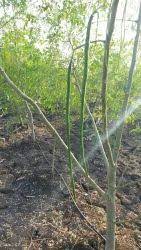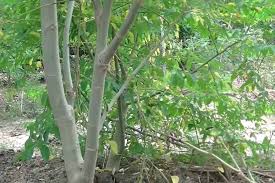Moringa is a genus of flowering plants that includes various species, with Moringa oleifera being one of the most well-known and widely cultivated. Lenticels are small, corky, and porous structures found on the stems and branches of many woody plants, including Moringa trees.
Lenticels serve as openings in the bark of the plant, allowing for the exchange of gases between the inner tissues of the stem and the external environment. They are essential for respiration and, in some cases, can help with transpiration and the release of excess moisture. Lenticels play a role in a plant’s overall health and can help prevent the buildup of gases that could otherwise harm the plant’s inner tissues.
In Moringa trees, lenticels are typically found on the stems and branches, and they are an important part of the tree’s adaptation to its environment. These trees are known for their hardiness and ability to grow in various climates, and the presence of lenticels is one of the features that contributes to their adaptability.
The Economic Importance and Uses of Moringa Lenticels

Moringa, also known as Moringa oleifera, is a highly versatile and beneficial plant with various economic uses. However, it’s important to note that lenticels are small, cork-like pores found on the surface of stems, helping with gas exchange in plants. Lenticels themselves do not have economic significance, but Moringa, as a whole, has several economic and practical uses.
Here are some of the economic uses and benefits of Moringa:
1. Nutrient-Rich Leaves: Moringa leaves are a rich source of essential nutrients, including vitamins, minerals, and amino acids. They are often used as a nutritious addition to human diets, contributing to food security in many regions.
2. Medicinal Uses: Moringa leaves, roots, and seeds have traditional medicinal uses. They are believed to have various health benefits, including anti-inflammatory, antioxidant, and antimicrobial properties.
3. Oil Production: Moringa seeds contain a high content of oil, known as Moringa oil or Ben oil. This oil is used in cooking, cosmetics, and as a lubricant for machinery.
4. Water Purification: Moringa seeds contain natural compounds that can help clarify turbid water. Crushed Moringa seeds can be used to purify water by removing impurities and making it safe for consumption.
5. Animal Fodder: Moringa leaves and stems are used as a high-quality fodder for livestock. They provide essential nutrients and can improve the health and productivity of animals.
6, Soil Improvement: Moringa can be used in agroforestry systems to improve soil fertility. Its roots can fix nitrogen, and its fallen leaves provide organic matter to the soil.
7. Biofuel Production: Moringa oil can be used as a feedstock for biofuel production. The oil can be processed to create biodiesel, which can be used as an alternative to fossil fuels.
8. Cosmetic and Skincare Products: Moringa oil is used in the cosmetic industry to create skincare products, such as lotions, soaps, and hair care items, due to its moisturizing and antioxidant properties.
9. Food Supplements: Moringa leaf powder is used as a dietary supplement to address nutritional deficiencies. It is rich in vitamins and minerals, making it a valuable addition to health and wellness products.
10. Export Crop: Moringa products, especially Moringa leaves and Moringa oil, can be exported to international markets, contributing to the economy of Moringa-producing countries.
11. Erosion Control: Moringa trees are planted to help control soil erosion in areas with fragile or degraded soils. Their deep roots can stabilize the soil and prevent erosion.
12. Sustainable Farming: Moringa can be intercropped with other crops, providing shade and improving soil quality. It’s often used in sustainable farming practices to enhance overall crop yields.
Read Also: Moringa Seeds: Economic Importance, Uses, and By-Products
13. Livelihoods and Income Generation: Growing, processing, and selling Moringa products can create employment opportunities and generate income for local communities in regions where the plant is cultivated.
The Products and By-products That Can Be Derived From Moringa Lenticels
Moringa lenticels are not typically a primary source for a wide range of products and by-products, as they are small, raised areas on the bark of the Moringa tree that facilitate gas exchange. However, different parts of the Moringa tree, such as its leaves, seeds, and roots, are known for their various uses and potential products. Here are some of the products and by-products that can be derived from different parts of the Moringa tree:
1. Moringa Leaf Powder: Moringa leaves are dried and ground into a fine powder, which is rich in vitamins, minerals, and antioxidants. It is used as a dietary supplement and in various recipes.
2. Moringa Tea: Dried Moringa leaves can be used to make herbal teas, which are believed to have health benefits.
3. Moringa Oil: Moringa seeds can be cold-pressed to extract Moringa oil, which is a nutritious oil used in cooking, cosmetics, and skin care products.
4. Moringa Seed Cake: After oil extraction, the remaining seed cake can be used as a fertilizer or as a water purification agent due to its flocculation properties.
5. Moringa Pods: The young, green pods of the Moringa tree are edible and can be cooked in various dishes. They are often used in curries and salads.
6. Medicinal Uses: The roots of the Moringa tree have been used in traditional medicine for their potential anti-inflammatory and anti-microbial properties.
7. Edible Flowers: Moringa flowers are edible and can be used in salads and as a garnish.
8. Traditional Uses: In some cultures, the bark of the Moringa tree has been used for its medicinal properties, such as treating various ailments.
9. Fuelwood: The wood of the Moringa tree can be used as fuelwood for cooking and heating.
10. Gum Resin: Moringa gum, also known as “drumstick gum,” is occasionally harvested and used in traditional medicine and as a food stabilizer.
In conclusion, important to note that the use and availability of these Moringa products and by-products can vary by region and cultural practices. Additionally, while Moringa is considered highly nutritious and beneficial, its utilization should be in accordance with local regulations and guidelines.
Read Also: How to Grow Hibiscus Flowers in Your Garden






